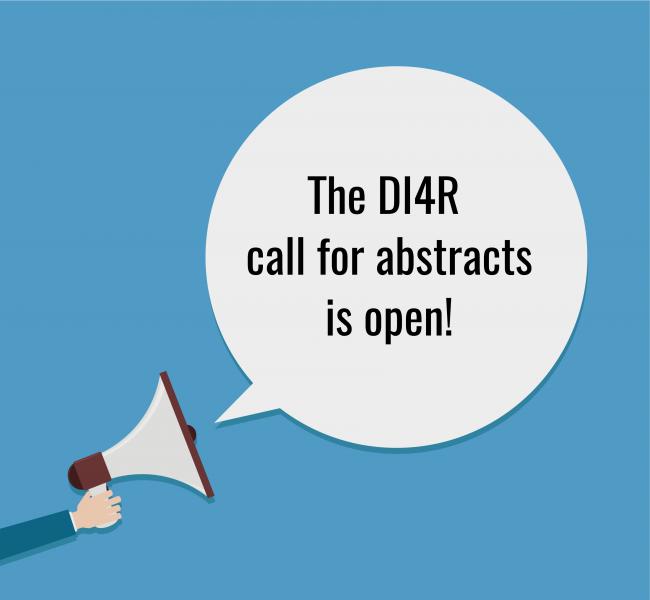
DI4R 2017 is taking place on 30th November and 1st December 2017 in the heart of the European Union: Brussels, Belgium. The organisers (EUDAT, EGI, GÉANT, OpenAIRE, RDA Europe and PRACE) invite all interested contributors to submit their abstracts by 13th October 2017 choosing among 6 different topics: Interoperability, Data Science & Skills, Impact evaluation and metrics, Security, trust and identity, The EOSC & EDI building blocks and Business models, sustainability and policies.
You can choose to submit an abstract for any of the following:
- 5-minute lightning talks
- posters
- demos
- single presentations (15 minutes)
- interactive sessions* (90 minutes)
Deadline for abstract submission is 13th October 2017
 |
Please note that contributions will be selected based on the following criteria:
- relation to the conference areas
- benefit for specific research projects, collaborations and researchers in specific scientific domains and/or multi-disciplinary science, higher education and industry/SMEs
- leverage and fostering of cross-collaboration
- contribution to the adoption of the FAIR principles
- support for the adoption of open science throughout the research process
- contribution to long-term sustainability of the EOSC and EDI building blocks.
As mentioned above, the following areas are envisaged as relevant for the choice of the topic(s) of the proposals:
This area focuses on topics related to interoperability between services from different infrastructures and initiatives, including architectures enabling interoperability, protocols and standards for interoperability and data and metadata interoperability.
The topic also includes items related to provisioning of federated services for research in Europe and beyond, enabling interoperability at all levels: human, organisational and policies.
The EC’s Open Science Skills Working Group Report defines Open Science skills as needs for researchers to be able to publish under open access, to manage (open) data, to conduct professional research and engage with citizen science.
Can you contribute answering the following questions?
What open science training is already available, what is needed to share this expertise?
- How can training be implemented in the curriculum of researchers? What could or should be the role of universities and research funders?
- How can we raise awareness among researchers on Open Science practices and behaviour?
- To what extent and how can we provide training for professional support staff for researchers (data stewards, IT technicians, data scientists, legal experts, discipline specific data managers and librarians)?
- How can we realise outreach and connect with professionals and citizens outside academia?
DI4R is looking for approaches, methodologies, initiatives and needs to establish the data science profession, to increase data science literacy and develop skills for the use of advanced digital services for data-driven science.
Metrics and impact are two important factors to monitor, and are key to measuring the progress of the Open Science. Metrics are also a reward to scientists for making their work understandable, accessible and reusable by the scientific community.
If you are:
- A scientist who has spent additional time to make your data reusable
- A data scientist who has exploited Open Data
- An infrastructure that proposes Open Data and/or Services
- Funding an open science initiative
- Working on the next generation of indicators and metrics
- Offering new services in this field
Then we want to hear about your successes, trials and ideas.
This track focuses on security and trust & identity aspects and represents an opportunity for e-infrastructures to present their offer to support researchers needs and to report on best practices and technical aspects that help new research infrastructures to build interoperable authentication and authorisation infrastructures.
Representatives from research collaborations and research infrastructures are invited to submit papers about:
- Trust and identity use-cases and how they are addressing them
- Gaps in the current services offering
- Risk assessment as part of the implementation of an Information Security Management System
- Security in Big and Open Data especially within the e-infrastructures
- Trust assessment and interoperability for global collaborations, comparative policy frameworks, and maintaining assurance across identity bridges
This area focuses on the development and provisioning of services and solutions needed to enable researchers to securely collaborate and share resources in a federated environment combining geographically distributed services from multiple providers and further the opportunities of Open Science.
Submissions should highlight thematic building blocks to the EOSC (how are Research Infrastructures, communities of practice and research projects coming together to jointly provide services to the EOSC?) and common building blocks (i.e. advanced computing, data storage, data management, findability, accessibility etc.).
Long-term access and provisioning of services require clear governance, engagement rules, policies and funding models. Submissions under this area should focus on the barriers, opportunities and changes in this environment in order to address the non-technical pressures, for example social, financial, legal and policy that influence the present and future opportunities.
Find full details on the DI4R 2017 Call for Abstracts here.
Submit your abstract here.
